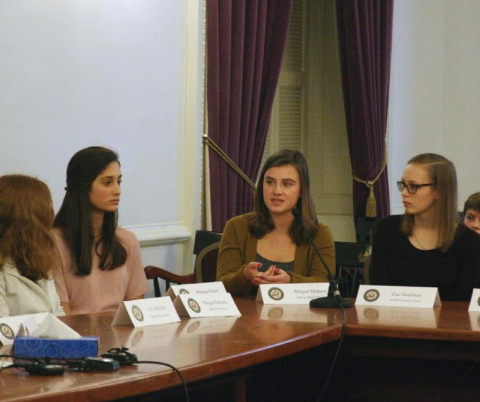How to Cure Political Polarization by Asking Questions (2018-2019)
Sharp divisions in beliefs are difficult to bridge. What if we could ask questions that would make us better at understanding different points of view?
Tackling the problem of political polarization, this project team investigated which questions increase humility, empathy and openness as well as which questions raise barriers to constructive discourse.
Team members took advantage of their varied backgrounds and skills to craft a series of experiments. One study used automatic, data-driven language analysis to spotlight distinctive ways that conservatives and liberals frame the same political issues differently on social media. Another study found that, despite common assumptions, more specific questions lead to more positive outcomes than ambiguous or abstract questions.
Team members presented their research at the universities of Connecticut, Colorado, Michigan and Manchester. Drawing on his involvement with the team, Philosophy professor Walter Sinnott-Armstrong published Think Again: How to Reason and Argue (Penguin and Oxford University Press) and engaged in public outreach through numerous popular outlets such as Time, the Wall Street Journal, and Psychology Today.
Timing
Fall 2018 – Spring 2019
Team Outputs
How to Ask Questions (poster by Rose Graves, J.J. Moncus, Thomas Nadelhoffer, Walter Sinott-Armstrong, Gus Skorburg, presented at EHDx, Duke University, April 9, 2019 and at Bass Connections Showcase, Duke University, April 17, 2019)
How to Cure Political Polarization (talk by Rose Graves and JJ Moncus, EHDx, Duke University, April 9, 2019)
Political Polarization and the Illusion of Explanatory Depth: A Theoretical and Empirical Investigation (poster by Joshua Skorburg, Aaron Ancell, Jordan Carpenter, Walter Sinnott-Armstrong, Jesse Summers, presented at Rocky Mountain Ethics Congress, University of Colorado, Boulder, August 9, 2018, and the Society for Philosophy and Psychology, University of Michigan, July 11, 2018)
This Team in the News
To Get Along Better, We Need Better Arguments
Interdisciplinary Team Collaborates on Solutions to Political Polarization
KIE Senior Fellow Featured on Forbes – “Walls: Knocking Down The Barriers That Divide Us”
Walls: Knocking Down the Barriers That Divide Us
Asking Questions to Reduce Political Polarization
Reach Out, Listen, Be Patient. Good Arguments Can Stop Extremism
Asking Questions to Reduce Political Polarization
Spotlighting Social Science to Address Political Polarization
The Beauty of a Good Argument with Walter Sinnott-Armstrong
This project team was originally part of the Education & Human Development theme of Bass Connections, which ended in 2022. See earlier related team, How to Ask Questions (2017-2018).

Team Leaders
- Walter Sinnott-Armstrong, Arts & Sciences-Philosophy
- Joshua Skorburg, Fuqua School of Business
/graduate Team Members
-
Hannah Read, Philosophy-PHD
/undergraduate Team Members
-
Rose Graves, Statistical Science (BS)
-
Kendrik Icenhour, Public Policy Studies (AB)
-
Jerry (JJ) Moncus, Mathematics (BS)
/yfaculty/staff Team Members
-
Aaron Ancell, Arts & Sciences-Philosophy
-
Jordan Carpenter, Kenan Institute for Ethics
-
David Malone, Arts & Sciences-Program in Education
-
Jesse Summers, Kenan Institute for Ethics|Arts & Sciences-Other - A&S
/zcommunity Team Members
-
Laura Benson, Partnership for Children
-
The Right Question Institute
-
Better Angels Organization
-
North Carolina Leadership Forum
